Posts by Christopher Lochhead
169 Silicon Valley & 5 Crisis Marketing / Communications Principles
Podcast (lochheadonmarketing): Play in new window | Download (Duration: 23:39 — 16.2MB) | Embed
Subscribe: Apple Podcasts | Spotify | RSS | More
Silicon Valley Bank’s collapse went off like a bomb on March 10th 2023. And I want to reach out to you and essentially share with you the conversations that I’ve been having with many friends, many entrepreneurs, many VCs, in the last 24 hours or so.
That said, let’s talk about what’s really going on; specifically, what the media talking heads and idiot, ‘thought leaders’ on the internet are getting very, very wrong. Second, we’ll discuss a few ideas on what you can do immediately to shore up your situation if you are a Silicon Valley Bank customer, or even if you are working in the tech world. And then thirdly, let’s talk about the crisis from the perspective of your company, and what you can do moving forward.
Welcome to Lochhead on Marketing. The number one charting marketing podcast for marketers, category designers, and entrepreneurs with a different mind.
The Silicon Valley Bank Collapse
As of now, what is clear is that Silicon Valley Bank went down in part, because of some combination of getting caught in a cash crunch. It appears they made some bad long term bond decisions at low interest rates. And as you know, the US government has been raising interest rates from about 0.25% roughly a year ago, to about 4.75% now a year later. This has caught a lot of people off guard.
This is not to say there wasn’t a mistake on SVB’s part, but what we do know is that there were some combination of over investing in long term bonds, and the interest rates going up that aggravated the problem.
Here’s a link to the Wall Street Journal article breaking all of what has happened so far.
Media and Thought Leaders’ “thoughts” on the matter
First of all, there’s a thread growing around that says, “Oh, this is the billionaires in Silicon Valley doing corrupt things, and now they’re getting their comeuppance.” This is not the case. If there was something incompetent or illegal that took place in the Silicon Valley Bank, we’ll find out once the investigations are done. But for now, it is affecting a lot of people in the space, and not just those billionaires they are harping about.
This is not some cash crunch hurting billionaires. It is hurting the people who didn’t get paid on Friday, because their employer just froze their bank. This is the entrepreneur who DM me on Twitter yesterday saying they have their entire 20 million of VC funding at SVB, and asking what they can do now. These entrepreneurs and CEOs don’t know how they’re going to pay their people, don’t know how they’re going to pay their bills.
It appears that the FDIC is saying that people will get their guaranteed 250,000 on Monday, but over 90% of the deposits in this bank are in excess of that. So it’s really not much protection. And while it seems that much of this money will come back to its rightful owner, it’s not clear what percentage and in what timeframe.
Running a business with no money is fucking hard. And that’s what’s going on here.
To learn more about the Silicon Valley Bank situation and how your business can cope with crisis of this magnitude, download and listen to this episode.
Bio
Christopher Lochhead is a #1 Apple podcaster and #1 Amazon bestselling co-author of books: Niche Down and Play Bigger.
He has been an advisor to over 50 venture-backed startups; a former three-time Silicon Valley public company CMO and an entrepreneur.
Furthermore, he has been called “one of the best minds in marketing” by The Marketing Journal, a “Human Exclamation Point” by Fast Company, a “quasar” by NBA legend Bill Walton and “off-putting to some” by The Economist.
In addition, he served as a chief marketing officer of software juggernaut Mercury Interactive. Hewlett-Packard acquired the company in 2006, for $4.5 billion.
He also co-founded the marketing consulting firm LOCHHEAD; the founding CMO of Internet consulting firm Scient, and served as head of marketing at the CRM software firm Vantive.
We hope you enjoyed this episode of Lochhead on Marketing™! Christopher loves hearing from his listeners. Feel free to email him, connect on Facebook, Twitter, Instagram, and subscribe on iTunes!
168 Career Considerations for Technology / Startup Professionals, Category Designers & Pirates
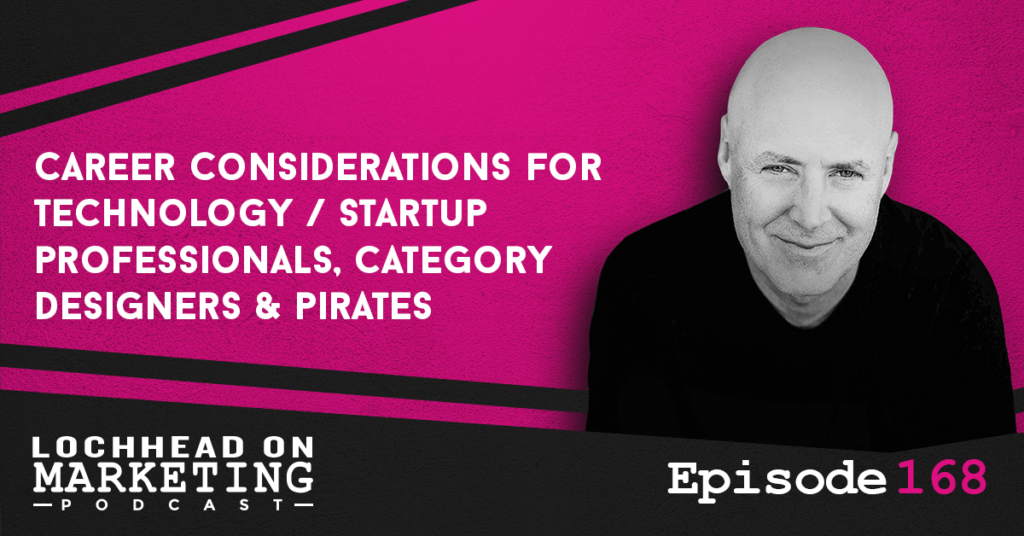
Podcast (lochheadonmarketing): Play in new window | Download (Duration: 18:23 — 12.6MB) | Embed
Subscribe: Apple Podcasts | Spotify | RSS | More
If you are in tech, a Silicon Valley type, in a startup, or you’re a category designer working in that world, this podcast is for you. Because today, we’re going to talk about career considerations for all of you. Whether you are planning to climb the corporate ladder or break away from it, we hope that his episode can help you figure things out.
Speaking of making a difference, my friends at Acceleration Economy are hosting a legendary virtual event called the Digital CIO Summit. It is not a stretch to say that some of the smartest people in the technology industry are going to be participating. And when some of the big thinkers in the tech world are willing to share their thinking, it is an incredible opportunity that you don’t want to miss. If you are interested, register today at AECIOSummit.com.
Welcome to Lochhead on Marketing. The number one charting marketing podcast for marketers, category designers, and entrepreneurs with a different mind.
How Category King Economics Work
The first thing that is important to talk about is how Category King Economics work, and what happens to its dynamics in downtimes.
When a new category emerges from a company or a small startup and gains traction, it attracts competition and investment. Eventually, a category king or queen will emerge from said companies and will have the bulk of the market at its grasp – almost two-thirds of the market or so.
As we have previously discussed in past episodes and in our book Play Bigger, these categories are usually developed during downtimes, or times of slower to no growth. This is because costumers will usually flock to the current category king or queen of their field, leaving number two and below competing for small portions.
Rather than compete for said small portion, these companies are now incentivized to create new categories themselves, one where they can thrive and dominate. Otherwise, their company is in for a slump and steady decrease in profits and market share.
Are you in a Category Battle?
So as a company, it is important to know how your product or services rank in their perspective category. If you’re the category king or head-to-head with the current one, that’s great. If not and you are steadily in number 2 or lower, it might be time to get the whiteboards out.
Why? Because it means that you are directly competing with pretty much the same product, with them having the superior specifications than yours. Hence, why customers and the bulk of the market choose them as the Category King rather than your company.
You are essentially fighting a losing battle at that point, and bleeding money as a result.
Time for Plan B
Now that you are aware of how companies do battle for the top spot in a category, let’s talk about you. If you find yourself in a company that is consistently placing 2nd or in the market, it may be time to consider some career moves.
The most obvious one is moving to the category king, and see what they are doing right over there. Another option is to go solo – a lot of solopreneurs tend to break out in these downtimes, either starting from a side hustle and developing it to a career, or working with other entrepreneurs and diving into a new startup with fresh ideas.
Take stock of what you have to offer, whether it be intellectual capital or experience, and locate a way to leverage it for your own benefit, whatever course of action you are considering taking. Also, look for a business or a circumstance that will allow you to reap the greatest benefits from the qualities you possess.
To hear more on Career Considerations for Category Designers, download and listen to this episode.
Bio
Christopher Lochhead is a #1 Apple podcaster and #1 Amazon bestselling co-author of books: Niche Down and Play Bigger.
He has been an advisor to over 50 venture-backed startups; a former three-time Silicon Valley public company CMO and an entrepreneur.
Furthermore, he has been called “one of the best minds in marketing” by The Marketing Journal, a “Human Exclamation Point” by Fast Company, a “quasar” by NBA legend Bill Walton and “off-putting to some” by The Economist.
In addition, he served as a chief marketing officer of software juggernaut Mercury Interactive. Hewlett-Packard acquired the company in 2006, for $4.5 billion.
He also co-founded the marketing consulting firm LOCHHEAD; the founding CMO of Internet consulting firm Scient, and served as head of marketing at the CRM software firm Vantive.
Don’t forget to grab a copy (or gift!) of one of our best-selling books:
Snow Leopard: How Legendary Writers Create A Category Of One
The Category Design Toolkit: Beyond Marketing: 15 Frameworks For Creating & Dominating Your Niche
A Marketer’s Guide To Category Design: How To Escape The “Better” Trap, Dam The Demand, And Launch A Lightning Strike Strategy
We hope you enjoyed this episode of Lochhead on Marketing™! Christopher loves hearing from his listeners. Feel free to email him, connect on Facebook, Twitter, Instagram, and subscribe on iTunes!
306 Beat The Odds: From Abused Orphan to Loving Father with Peter Mutabazi, Bestselling Author: Now I Am Known
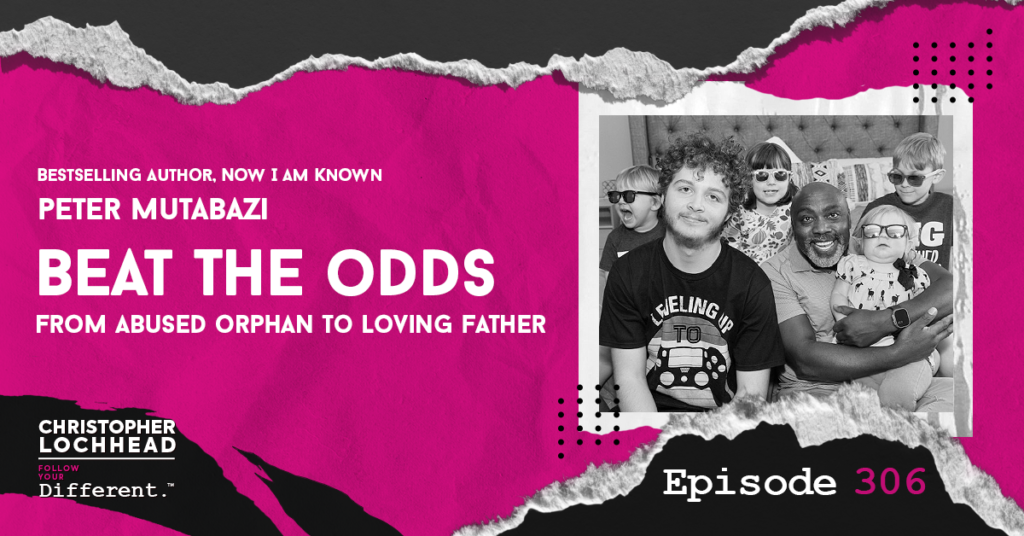
Podcast: Play in new window | Download (Duration: 1:01:59 — 42.6MB) | Embed
Subscribe: Apple Podcasts | Spotify | Pandora | RSS | More
When we come face to face with the raw enormity of the human spirit, it can be truly stunning. And when we encounter a person who is so magnanimous, they inspire us to ask questions like, “What could I do?” Today on Christopher Lochhead: Follow Your Different, we talk to one such person, Peter Mutabazi.
Peter grew up in shocking poverty, was called garbage and physically abused by his father. He ran away from home, and by 10 years of age became a “street kid” in the capital of Uganda Kampala. Today, Peter lives in America, and he’s living a legendary life as a foster dad. He is also running a foundation called I Am Known Foundation, and his mission is to help increase foster parenting to help care for the most vulnerable children in our country.
By the end of this episode, you will gain a visceral understanding of how a person can literally traverse from the worst imaginable situations as a child to achieving success, happiness, and a deep sense of what he calls true worth.
Peter Mutabazi on Teenage Adoption
The conversation starts off on the topic of adoption, particularly on teenage adoption. While most of the conversations about adoption revolve around adoption as a child, teenage adoption is very rarely talked about.
For Peter, this age period is particularly vulnerable for them, as they prepare to be part of society when they become 18. If there was no one to guide these teenagers, then they would have nowhere to go afterwards, and no way to establish themselves.
“When you’re 15 and you have only three years left in the foster care system, and you have nowhere to go, it’s critical for anyone to step up and guide you to the world you’ve never lived, that you don’t know. So I feel like they’re the most vulnerable and need the most talk.”
– Peter Mutabazi
Peter also comments that teenage adoptees are easier to be with. This might be due to the fact that they can pretty much handle themselves in their day-to-day lives, provided that they have the support and resources to do so.
Peter Mutabazi on his Origin Story
Peter tells the story of his youth in a village called Kabaddi, which was located at the border of Uganda and Rwanda. From the get-go, life was harsh to them, as even the basic necessities are hard to come by at times.
Peter shares that he wasn’t even given a name until he was 3 years old, as the survival rate of babies was so low, they did not want to give them names and form attachments before they are sure that he could survive.
“I also got to learn that I didn’t have a name until when I was three years old. Why? Because for every 100 children were born in my village 60 would die before the age of two. So most moms were afraid to name a child because they didn’t want to get attached.”
– Peter Mutabazi
To add another layer of difficulty to all that, Peter’s father was what you’d call abusive, in every sense of the world. Peter quips that in a normal family, even if you suffer through hardships, there’s always some comfort of knowing that you have a home to return to. In his case, it was the most agonizing place to be in because of his father.
So at the young age of 10, Peter decided that he had had enough. He ran away from home.
To hear more from Peter Mutabazi and his story of growing up with an abusive father to being the father to those in dire need of it, download and listen to this episode.
Bio
Peter Mutabazi
Peter Mutabazi is an entrepreneur, an international advocate for children, and the founder of Now I Am Known, a corporation that supplies resources to encourage and affirm children.
A single father and foster dad, Mutabazi is a former street kid who has worked for World Vision, Compassion International, and the Red Cross.
He has appeared on media outlets such as the BBC and The TODAY Show and continues to be a passionate speaker. He currently lives in Charlotte, North.
Links
Connect with Peter Mutabazi!
NowIAmKnownFoundation.org | Now I Am Known | Facebook | Instagram
Check out his book here: Now I Am Known | Amazon
305 How To Design A Legendary Career, Company, And Category with Gail Moody-Byrd of LinkedIn (Part 2)
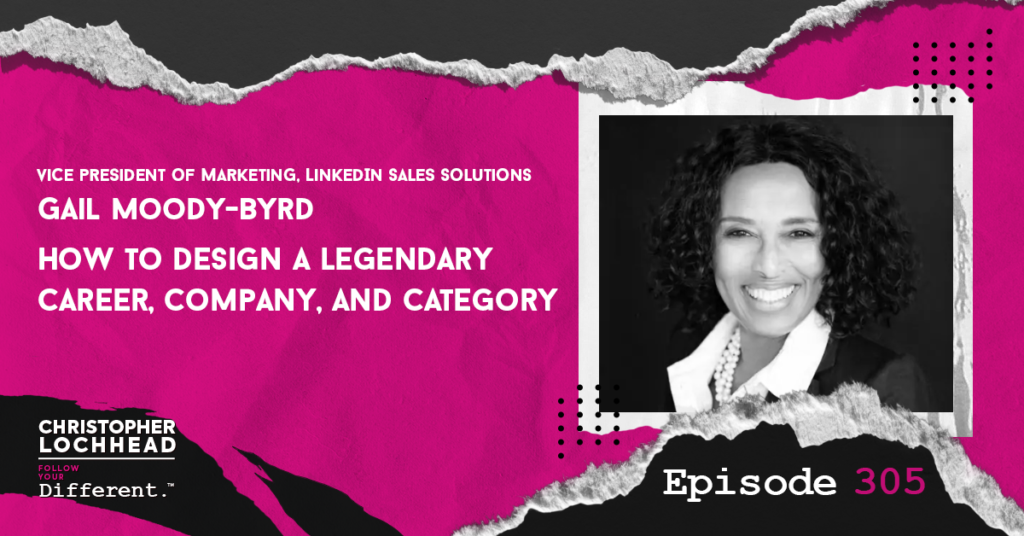
Podcast: Play in new window | Download (Duration: 1:03:08 — 43.3MB) | Embed
Subscribe: Apple Podcasts | Spotify | Pandora | RSS | More
This is part two of a very special Christopher Lochhead: Follow Your Different series that we are doing on how to design a legendary career, company and category. This two-part series is a masterclass on how to have a legendary career in technology from 2 different perspectives. On this episode, we have a dialogue with the amazing Gail Moody-Byrd.
Gail Moody-Byrd is the head of Marketing for LinkedIn Sales Solution Group. And the job that she’s done there on category design is truly a stunner. I myself have known and done some work with Gail in the past, and she’s also worked with my friends and adopted brothers from Category Design Advisors.
If you’ve ever wanted to know how to drive massive big change inside a massive big organization to make a massive big difference, you’re in the right place. You’re also going to learn what it took for a Harvard MBA to become a successful category designer, and get executive management bought in and participating in a massive new strategic initiative like category design.
There are many people who would easily pay $25,000 to have lunch with Gail, and today you got her for free and on repeat. We hope you’ll enjoy this conversation as much as we did.
Creating a New Category in LinkedIn
The conversation starts off with acknowledging that Gail Moody-Byrd has done something extraordinarily rare in the business – which is to have implemented a category design approach within a monster corporation, which is within an even bigger monster corporation.
This is because normally when you think of implementing category design in a business, it is usually done by startups and entrepreneurship, which may develop later on to a category business leader. Though it is not unheard of, it’s highly unusual for a megacorporation to attempt such a thing.
But according to Gail, it all stems from the culture within LinkedIn itself, where they are encouraged to pursue and grow their business the way they see fit, almost like the same energy as a startup would, but with the backing of a monster corporation behind it.
So when Gail joined the LinkedIn Sales Solutions Group, they already had the idea of finding something to elevate their status and “get their mojo back”. And Gail was just the spark they were looking for.
Gail Moody-Byrd on the Curiosity of LinkedIn
Christopher shares his experience with introducing Category Design to big corporations, and the less than successful results he would get a times. This is because major corporations tend to stay rigid and not dive into new ideas that easily, especially if their current product or service still has a huge share of the market at the moment.
Gail agrees with this and adds that while LinkedIn may seem like the same on the outside, it has this inherent curiosity within that lets their people explore new ideas, as long as it stays within company guidelines and has the data to back it up.
“The beauty of LinkedIn is that they gave me the liberty to explore some of those ideas. There’s a curiosity within LinkedIn that I appreciate. We’re so market driven, and interactive, always looking for new ideas. And so the amount of support and the extreme receptivity to the conversation was, frankly, shocking to me.”
– Gail Moody-Byrd
Evolving the Platform through Category Design
Gail Mood-Byrd then talks about LinkedIn Sales Solutions, and its growth and changes over the years. It was created 10-11 years ago to enable salespeople in the b2b space to connect on the LinkedIn platform with people who might need their services.
Over the years, it has grown from being a way to connect with potential buyers and fielding available talents, to something backed by support and data science to help you find the information and the system actively looking non-stop for related data to your inquiries and target audience.
It has also gone from one-way communication, to something akin to an active conversation between potential buyers and sellers; all in a trusted network like LinkedIn. And that is something Gail and her team aim to develop further with category design in mind.
To hear more from Gail Moody-Byrd and How To Design A Legendary Career, Company, And Category, download and listen to this episode.
Bio
Gail Moody-Byrd
Vice President, Marketing, LinkedIn Sales Solutions
Member, Board Of Directors, Grocery Outlet (NASDAQ:GO)
A seasoned Senior Marketing Executive, two-time Category Creator and public board member with extensive experience in all aspects of Global Marketing, Sales and Strategy across industries, from enterprise software to retail/commerce. Propelled by a vision full of possibilities, acts as a change-maker who leads and inspires teams to deliver results, exceed expectations and grow as leaders themselves.
Links
More about Gail Moody-Byrd
Category Design Advisors: Category Design Lightning Strike of 2022
We hope you enjoyed this episode of Christopher Lochhead: Follow Your Different™! Christopher loves hearing from his listeners. Feel free to email him, connect on Facebook, Twitter, Instagram, and subscribe on iTunes!
167 The Monster Category Battle: OpenAI & Microsoft vs Google
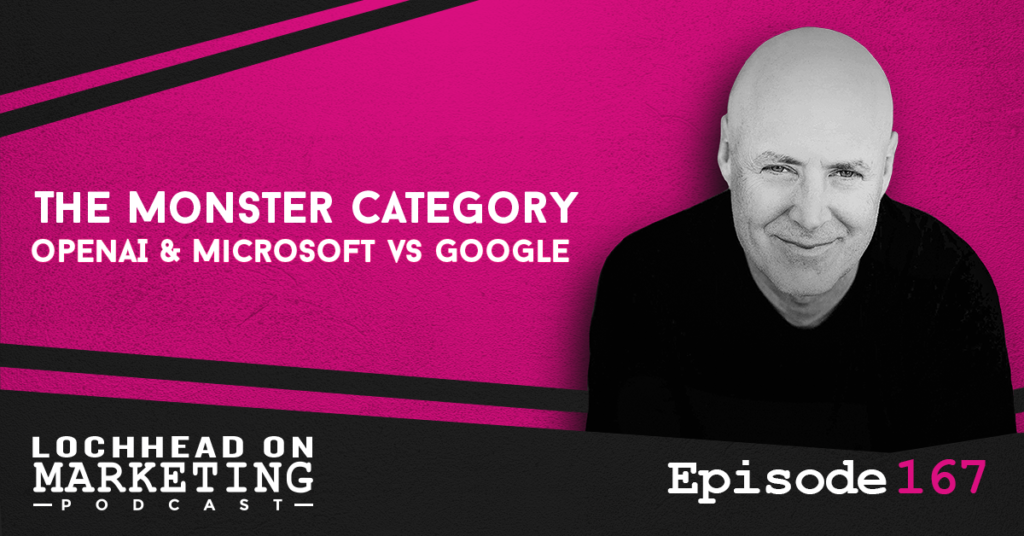
Podcast (lochheadonmarketing): Play in new window | Download (Duration: 21:13 — 14.6MB) | Embed
Subscribe: Apple Podcasts | Spotify | RSS | More
On this episode of Lochhead on Marketing, let’s talk about what most people are missing about the biggest category battle of the decade: OpenAI & Microsoft vs. Google.
Even some of the smartest people in business can’t see what’s happening here, as most people don’t have a category design lens; they have a competition lens. The competition lens is about winning a comparison game with other companies, which at most leads to a small piece of the market share, and rarely leads to being the category leader of said field.
So join us as we dig into how to view the new AI category battle through the category lens, beyond product brand, and business model.
Welcome to Lochhead on Marketing. The number one charting marketing podcast for marketers, category designers, and entrepreneurs with a different mind.
Categories Matter
Before we look into things through the category lens, we need to point out why categories matter so much. The simple answer is: categories matter because that’s how human brains make sense of information.
“Here’s a simple example: If I say to you: ‘automobile’, you know what that is. And then if I say to you muscle car, you know that a muscle car is a subcategory of automobile. Because the way the human mind works is that you and I ascertain information, and we need to put it somewhere in a file folder, because we need to sort that shit out and make sense of it.”
– Christopher Lochhead
The second piece of it is, each of these categories and subcategories, these folders in our mind are also a hierarchy of value. Whichever is valuable or not is how they are perceived by everyone, and we collectively give some things higher values than others, even if it sometimes doesn’t make sense why some things are more expensive than things that are actually important.
Remember, there was a point in time where nobody paid for water. And then Evian showed up and got people to pay a premium price for a free product they had in their tap.
OpenAI vs Microsoft
So we get to the meat of the dialogue, which is about Microsoft & OpenAI and their new product, ChatGPT. ChatGPT represents a new category called consumer AI. Though there have been previous AI technologies that have been launched it the web before, none are as well-defined and has had a impact as big as ChatGPT.
This in turn got people thinking if Microsoft is muscling in on the Search War. Well, not exactly – because Microsoft already lost that battle with their Bing search engine. Google controls about 83% market share of searches online, compared to Microsoft Bing’s 9.9%. So clearly, Google is the Category King in that regard.
ChatGPT, however, is a whole other product and a different category altogether. ChatGPT does not search for the answer, it creates the answer based on the collective information that is available to it. It’s not he old category of Search, but a new category called Answer.
After the success of OpenAI & ChatGPT grew and garnered more positive feedback from the market, Google has decided to create its own version of it. Which is ironic, as they fell into the same trap that Microsoft found themselves in with Bing before.
To learn more about the surge of new categories from AI, and how to treat these new categories from a category lens perspective, download and listen to this episode.
Bio
Christopher Lochhead is a #1 Apple podcaster and #1 Amazon bestselling co-author of books: Niche Down and Play Bigger.
He has been an advisor to over 50 venture-backed startups; a former three-time Silicon Valley public company CMO and an entrepreneur.
Furthermore, he has been called “one of the best minds in marketing” by The Marketing Journal, a “Human Exclamation Point” by Fast Company, a “quasar” by NBA legend Bill Walton and “off-putting to some” by The Economist.
In addition, he served as a chief marketing officer of software juggernaut Mercury Interactive. Hewlett-Packard acquired the company in 2006, for $4.5 billion.
He also co-founded the marketing consulting firm LOCHHEAD; the founding CMO of Internet consulting firm Scient, and served as head of marketing at the CRM software firm Vantive.
Don’t forget to grab a copy (or gift!) of one of our best-selling books:
Snow Leopard: How Legendary Writers Create A Category Of One
The Category Design Toolkit: Beyond Marketing: 15 Frameworks For Creating & Dominating Your Niche
A Marketer’s Guide To Category Design: How To Escape The “Better” Trap, Dam The Demand, And Launch A Lightning Strike Strategy
We hope you enjoyed this episode of Lochhead on Marketing™! Christopher loves hearing from his listeners. Feel free to email him, connect on Facebook, Twitter, Instagram, and subscribe on iTunes!
304 How To Design A Legendary Career, Company, And Category with Joe Sexton (Part 1)
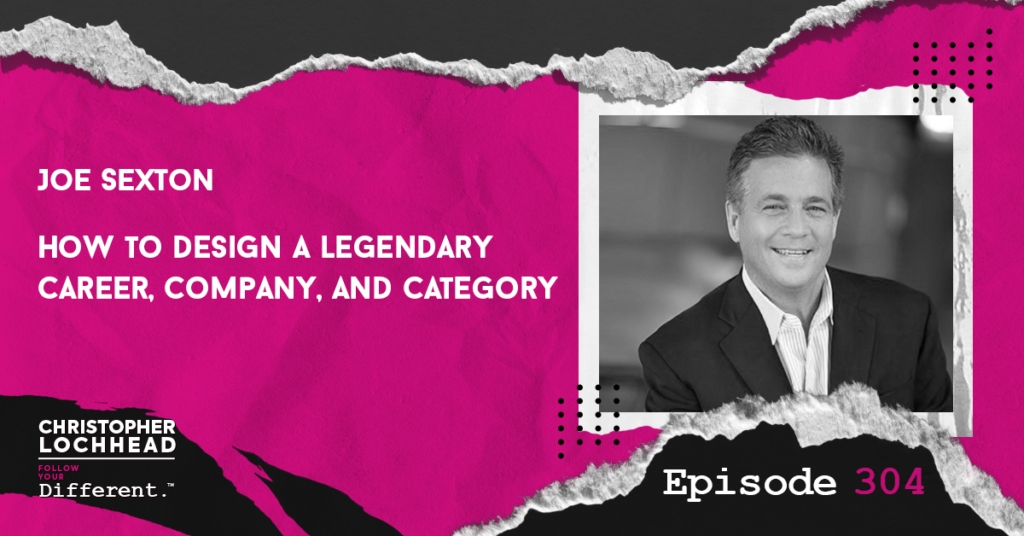
Podcast: Play in new window | Download (Duration: 1:46:49 — 73.4MB) | Embed
Subscribe: Apple Podcasts | Spotify | Pandora | RSS | More
This episode of Christopher Lochhead: Follow Your Different is part of a very special two-part series that we are doing on how to design a legendary career, company and category. This two-part series is a masterclass on how to have a legendary career in technology from 2 different perspectives. On this episode, we have a dialogue with the legendary Joe Sexton.
Joe Sexton has been a material contributor to creating well over $40 billion in market value over his legendary career. He’s one of the most legendary sales revenues and frankly, overall company leaders I’ve met or ever had the pleasure of working with.
There are many people who would easily pay $25,000 to have lunch with Joe, and today you got him for free and on repeat. So sit back and let this conversation take you into new heights and ideas in the next hour or so.
How to Change to Conversation in Tech Industries
Christopher and Joe reminisce on the time they spent working together, what they learned from each other during that time, and how they were able to apply what they had learned from each other to their own practices after they pursued their own paths.
For Joe Sexton, it was all about changing the conversation about things. Whether he went to McAfee, CrowdStrike, and other different fields in tech, his understanding in improving their business and becoming business leaders in their respective categories was on how to change the conversation, i.e. making a radical change in the usual perspective of a certain product, or creating a new one for a problem that people didn’t think of solving before.
Know What You Know, and Execute
Joe Sexton has taken may advisory roles over the course of his career, and have heard from CEOs that doesn’t seem to know what exactly their company does, or what they do in it.
“I’ve spoken literally to well over 100 CEOs in my board role. I’ve heard pitch after pitch after pitch, and 99 times out of 100, after a half hour of passionate talk and presentation by the CEO, I say, “I’ve been doing these 35 years, and I don’t understand what you said. I mean, I only understand what you do.””
– Joe Sexton
On the other hand, Joe has also worked with people who knew what they were good at, and got his help so they could focus on the thing they’re good at, rather than stretching themselves thin. Of course, it doesn’t mean that you only stay on that level for the rest of your company’s development, but learning where you can help your business grow, especially during its start, can spell success or failure in startups and the like.
Joe Sexton on Creating Your Opportunities
When asked about how he would create opportunities for himself when he got started, Joe replies that that is one of the questions that young people ask him.
To answer the question, Joe shares that one must have a good track record on their field and the data to back it up. Because when it’s time to compete in the market, these two things will speak for themselves, rather than coming up with a soft pitch and hoping for the best.
It’s like explaining what you are worth to a company or a potential investor, without needing to resort to technical babble or telling your story from scratch. Having that track record and reputation and the data to back it up means that they have something to look into before you even meet, and that could put them at ease.
To learn more about How To Design A Legendary Career, Company, And Category, download and listen to this episode.
Bio
Joe Sexton
Mr. Joe Sexton is an accomplished technology executive who’s been part of creating over $40 billion in value.
He’s served as CEO, President, CRO and SVP, advisor and/or board member for more than a dozen category designing technology firms.
He is the former President of Worldwide Field Operations at AppDynamics. ($3.7B purchase by Cisco)
Prior to AppDynamics, he spent significant time in senior leadership roles at McAfee ($5B public co), Mercury Interactive ($4.5B purchase by HP) and CA Technologies ($20B public).
Joe is currently on the Board of Directors of Aqua Security, Menlo Security, D2iQ, DecisionLink and BrainBox Intelligent Marketing.
He is formerly on the Board of CrowdStrike and Executive Advisory Board of PagerDuty helping both companies experience successful IPOs.
Joe is also a private investor in several promising technology startups.
Joe earned his BA in Marketing from the University of Kentucky.
He is very passionate about mentorship, helping women succeed in the workplace and teaching salespeople how to become Value Professionals.
Links
Connect with Joe Sexton!
We hope you enjoyed this episode of Christopher Lochhead: Follow Your Different™! Christopher loves hearing from his listeners. Feel free to email him, connect on Facebook, Twitter, Instagram, and subscribe on iTunes!
166 Why The Future Belongs To Intellectual Capitalists on Cloud Wars Live

Podcast (lochheadonmarketing): Play in new window | Download (Duration: 1:01:40 — 42.3MB) | Embed
Subscribe: Apple Podcasts | Spotify | RSS | More
On this episode of Lochhead on Marketing, we are going to drop a conversation that I recently had with my dear friend, one of the smartest guys in tech, Bob Evans, on his podcast, Cloud Wars Live. If you work in technology, what Bob and his guests have to say is fascinating, illuminating, and, frankly, agenda-setting. If you’re a regular reader of Category Pirates, you’ll know that we’ve been writing about intellectual capitalists and the emergence of a whole new human category, Native Digitals, for quite some time. We believe this is an extremely important topic, and we believe that the emergence of the intellectual capitalist as the highest value role in the work world above that of what has historically been the highest value job you can have in the working world, which is the knowledge worker, is particularly significant. Because those of us who will thrive not just survive in the future, we’ll move beyond acquiring knowledge and getting paid to apply that knowledge to getting paid to create and monetize new categories of intellectual capital, new categories of knowledge, new categories of thinking, which can be turned into new products and services.The Story of the Hummingbird
The conversation starts off with Christopher telling the story of the Hummingbird and his Sensei Sutton. His sensei is an amazing martial artist and a badass individual, but at a certain point in his life, he had to overcome many adversities before getting to where he is now.“So the moral of the story is in life – Sometimes you’re the hummingbird and sometimes you’re the sensei. But Sooner or later, we all need somebody to catch us tightly enough not to hurt us, but strongly enough to save us.” – Christopher LochheadIn life, we will absolutely be in situations where we are the hummingbird. But the real question is, when we have an opportunity to be the Sensei, will we will we meet the call?
ChatGPT and the Death of the Knowledge Worker
Christopher then talks about the current boom in AI technology, particularly on the topic of ChatGPT and similar AI generated content. Much like how machinery and Automation have taken over some aspects of labor from men, this new AI technology seems to be crowding in the profession of Knowledge Worker. While it may not be up to par with certain intricacies to date, it is quickly learning and becoming better over a short period of time. And much like the service workers of the past have to learn to adapt to new technology, Knowledge Workers also have to follow the trend and evolve, paving the way to what we call Intellectual Capitalists.Intellectual Capitalist
So what is an Intellectual Capitalist? For Christopher, it’s someone who doesn’t just collect information and apply it like a knowledge worker, but someone who actually generates net-new knowledge. It could be from their experience while working on a certain field that makes them faster, more efficient, or outright the best in that field. In one word, an Intellectual Capitalist has Leverage over other people who are in the same field, but can’t do it better or even as good as them. An Intellectual Capitalist should also not be only bound to current categories and ideologies. If there is an idea worth pursuing, it’s not enough to learn why it hasn’t been done before. One should also look through it with what we have today, and if the rapidly-growing pace of technology will be able to support it and when. To hear more about the dialogue about AI and the Intellectual Capitalist, download and listen to this episode.Bio
Bob Evans Founder of Cloud Wars and Co-Founder of the Acceleration Economy, Bob leads the strategic direction of the global analyst network and actively covers the Cloud and Digital Business categories. Creator of Cloud Wars Top 10, a ranking and ongoing analysis world’s most influential tech companies driving digital business and the digital economy. World-class strategic communicator focused on emerging business strategy, disruptive innovation, and forward-looking leadership.Links
Follow Cloud Wars Live! Acceleration Economy Network | Apple Podcasts | Spotify Related links to the discussion: The Digital American Dream: Life, Liberty, And The Exponential Pursuit Of Capital The Digital Creation Game: Exiting The Analog World Of Competition And Entering The Digital World Of Infinite Creation Paid To Create: How To Leverage Your Intellectual Capital To Accelerate Your Career & Achieve Financial Freedom The Mentor Myth: What Native Analogs Can Learn From Native Digitals (And Vice Versa) We hope you enjoyed this episode of Lochhead on Marketing™! Christopher loves hearing from his listeners. Feel free to email him, connect on Facebook, Twitter, Instagram, and subscribe on iTunes!303 Why The Future Belongs To Intellectual Capitalists on Cloud Wars Live
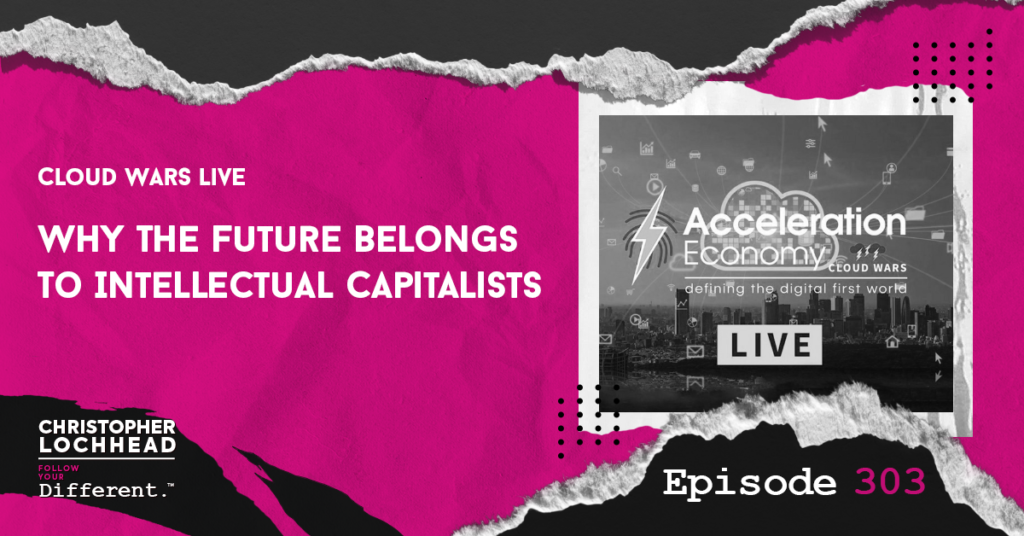
Podcast: Play in new window | Download (Duration: 1:01:40 — 42.3MB) | Embed
Subscribe: Apple Podcasts | Spotify | Pandora | RSS | More
On this episode of Christopher Lochhead, Follow Your Different, we are going to drop a conversation that I recently had with my dear friend, one of the smartest guys in tech, Bob Evans, on his podcast, Cloud Wars Live.
If you work in technology, what Bob and his guests have to say is fascinating, illuminating, and, frankly, agenda-setting. If you’re a regular reader of Category Pirates, you’ll know that we’ve been writing about intellectual capitalists and the emergence of a whole new human category, Native Digitals, for quite some time. We believe this is an extremely important topic, and we believe that the emergence of the intellectual capitalist as the highest value role in the work world above that of what has historically been the highest value job you can have in the working world, which is the knowledge worker, is particularly significant.
Because those of us who will thrive not just survive in the future, we’ll move beyond acquiring knowledge and getting paid to apply that knowledge to getting paid to create and monetize new categories of intellectual capital, new categories of knowledge, new categories of thinking, which can be turned into new products and services.
The Story of the Hummingbird
The conversation starts off with Christopher telling the story of the Hummingbird and his Sensei Sutton. His sensei is an amazing martial artist and a badass individual, but at a certain point in his life, he had to overcome many adversities before getting to where he is now.
“So the moral of the story is in life – Sometimes you’re the hummingbird and sometimes you’re the sensei. But Sooner or later, we all need somebody to catch us tightly enough not to hurt us, but strongly enough to save us.”
– Christopher Lochhead
In life, we will absolutely be in situations where we are the hummingbird. But the real question is, when we have an opportunity to be the Sensei, will we will we meet the call?
ChatGPT and the Death of the Knowledge Worker
Christopher then talks about the current boom in AI technology, particularly on the topic of ChatGPT and similar AI generated content.
Much like how machinery and Automation have taken over some aspects of labor from men, this new AI technology seems to be crowding in the profession of Knowledge Worker. While it may not be up to par with certain intricacies to date, it is quickly learning and becoming better over a short period of time.
And much like the service workers of the past have to learn to adapt to new technology, Knowledge Workers also have to follow the trend and evolve, paving the way to what we call Intellectual Capitalists.
Intellectual Capitalist
So what is an Intellectual Capitalist? For Christopher, it’s someone who doesn’t just collect information and apply it like a knowledge worker, but someone who actually generates net-new knowledge. It could be from their experience while working on a certain field that makes them faster, more efficient, or outright the best in that field.
In one word, an Intellectual Capitalist has Leverage over other people who are in the same field, but can’t do it better or even as good as them.
An Intellectual Capitalist should also not be only bound to current categories and ideologies. If there is an idea worth pursuing, it’s not enough to learn why it hasn’t been done before. One should also look through it with what we have today, and if the rapidly-growing pace of technology will be able to support it and when.
To hear more about the dialogue about AI and the Intellectual Capitalist, download and listen to this episode.
Bio
Bob Evans
Founder of Cloud Wars and Co-Founder of the Acceleration Economy, Bob leads the strategic direction of the global analyst network and actively covers the Cloud and Digital Business categories.
Creator of Cloud Wars Top 10, a ranking and ongoing analysis world’s most influential tech companies driving digital business and the digital economy. World-class strategic communicator focused on emerging business strategy, disruptive innovation, and forward-looking leadership.
Links
Follow Cloud Wars Live!
Acceleration Economy Network | Apple Podcasts | Spotify
Related links to the discussion:
The Digital American Dream: Life, Liberty, And The Exponential Pursuit Of Capital
The Mentor Myth: What Native Analogs Can Learn From Native Digitals (And Vice Versa)
We hope you enjoyed this episode of Christopher Lochhead: Follow Your Different™! Christopher loves hearing from his listeners. Feel free to email him, connect on Facebook, Twitter, Instagram, and subscribe on iTunes!
302 How To Start Strong & Win Big with Floodgate Investor Carly Malatskey
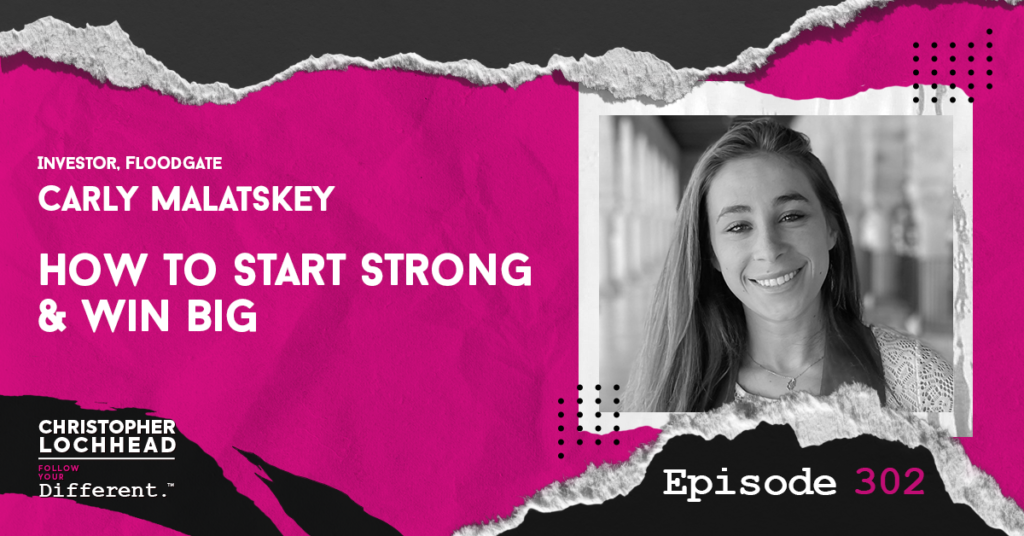
Podcast: Play in new window | Download (Duration: 57:26 — 39.4MB) | Embed
Subscribe: Apple Podcasts | Spotify | Pandora | RSS | More
Position yourself or be positioned has long been one of my favorite expressions. Most people think of life as something that happens to us, and that we have no agency to design our lives. It turns out, successful people like our guest Carly Malatskey, tends to think differently from that. They learn to create and seize upon opportunity before they succeed, they position themselves for success.
Carly Malatskey hosts the SheLeads podcast, which is a podcast network made by women for women. Carly is also a two-time Stanford National Soccer champion, and has also started off her career as a new Venture Capital Investor at the legendary Floodgate in Silicon Valley.
On this episode of Christopher Lochhead: Follow Your Different, what you’re about to experience is a real dialogue about how to seek out legendary mentors and surround yourself with legendary people. We also talk about what it takes to win championships at the highest level, and how to start your career in a strong, powerful way and much, much more.
Carly Malatskey on Starting a Podcast
The conversation starts off with Carly being asked as to why she started her own podcast, and the types of dialogues she wants to have in it.
Carly explains that she has always loved listening to podcasts. But she also thought that as a young leader, she has the opportunity to talk to other leaders in different fields, and have a conversation from the view point of a young woman who has the youthful energy of coming out of the academe but still has a lot to learn and experience in the field.
This also comes at the cusp of COVID, so she along with countless leaders and individuals are currently stuck at home and pretty much open to doing conversations over zoom and the like. It just seemed to Carly that it was the right time to take a chance at it and reach out to different types of people so they can share their experiences with her and other young aspiring leaders.
SheLeads Podcast: A Podcast for Women by Women
Carly shares that one aspect of SheLeads podcast is that it is from the perspective of incredible female leaders in different fields and industries.
“I talked to Olympians, founders, lawyers, and I thought, “why not have this aspect where these women are also talking to someone like me?” And thinking of how they started their career, what were their first steps, or how were they thinking through their career.”
– Carly Malatskey
Men and Women Communicate Differently
When asked about the saying that men and women communicate differently, Carly shares her thoughts on the matter.
For Carly, it’s much more natural for women to sit across from someone and really just sit for hours, talking. The topics could range from their experiences this past week or so, something that worries them in the future, or their feelings about certain matters.
For men, they need an activity to distract them from the fact that they’re actually sharing their thoughts with another individual. It’s almost like it’s an excuse to talk and bond over something, though it was their original intention to begin with.
Carly found the question quite interesting, and was even thinking if there was a scientific reasoning for these types of behaviors.
To hear more from Carly Malatskey on how to win big and start your career stronger, download and listen to this episode.
Bio
Carly Malatskey is an Investor at seed-stage VC firm, Floodgate.
Prior to Floodgate, she earned her Bachelors in Science, Technology and Society from Stanford University and was a Mayfield Fellow at Stanford as well. She also played for the Stanford Women’s Soccer team for 4 years and won 2 National Championships!
Shortly before graduating, she started a podcast called SheLeads with Carly, where she speaks to powerful female leaders from all industries. With 80+ episodes, she explores their unique paths to becoming leaders in their fields as well as the lessons they learned along the way. It is available on Apple Podcasts, Spotify, and Facebook (video version).
Links
Connect with Carly Malatskey!
Floodgate | Twitter | Apple Podcast | Spotify | SheLeads Show on Facebook
We hope you enjoyed this episode of Christopher Lochhead: Follow Your Different™! Christopher loves hearing from his listeners. Feel free to email him, connect on Facebook, Twitter, Instagram, and subscribe on iTunes!

